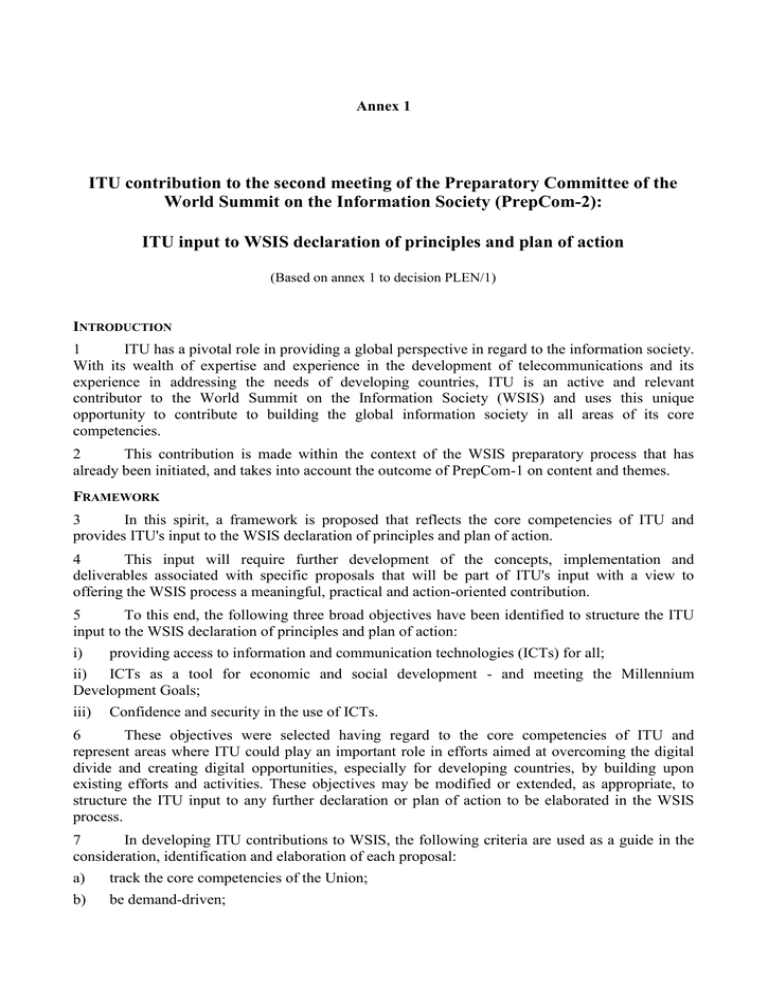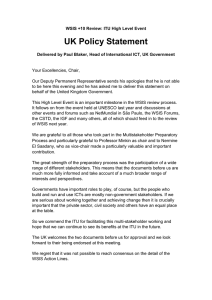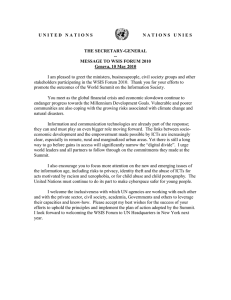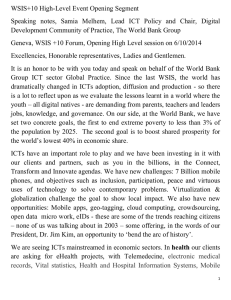ITU contribution to the second meeting of the Preparatory Committee... World Summit on the Information Society (PrepCom-2):
advertisement

Annex 1 ITU contribution to the second meeting of the Preparatory Committee of the World Summit on the Information Society (PrepCom-2): ITU input to WSIS declaration of principles and plan of action (Based on annex 1 to decision PLEN/1) INTRODUCTION 1 ITU has a pivotal role in providing a global perspective in regard to the information society. With its wealth of expertise and experience in the development of telecommunications and its experience in addressing the needs of developing countries, ITU is an active and relevant contributor to the World Summit on the Information Society (WSIS) and uses this unique opportunity to contribute to building the global information society in all areas of its core competencies. 2 This contribution is made within the context of the WSIS preparatory process that has already been initiated, and takes into account the outcome of PrepCom-1 on content and themes. FRAMEWORK 3 In this spirit, a framework is proposed that reflects the core competencies of ITU and provides ITU's input to the WSIS declaration of principles and plan of action. 4 This input will require further development of the concepts, implementation and deliverables associated with specific proposals that will be part of ITU's input with a view to offering the WSIS process a meaningful, practical and action-oriented contribution. 5 To this end, the following three broad objectives have been identified to structure the ITU input to the WSIS declaration of principles and plan of action: i) providing access to information and communication technologies (ICTs) for all; ii) ICTs as a tool for economic and social development - and meeting the Millennium Development Goals; iii) Confidence and security in the use of ICTs. 6 These objectives were selected having regard to the core competencies of ITU and represent areas where ITU could play an important role in efforts aimed at overcoming the digital divide and creating digital opportunities, especially for developing countries, by building upon existing efforts and activities. These objectives may be modified or extended, as appropriate, to structure the ITU input to any further declaration or plan of action to be elaborated in the WSIS process. 7 In developing ITU contributions to WSIS, the following criteria are used as a guide in the consideration, identification and elaboration of each proposal: a) track the core competencies of the Union; b) be demand-driven; c) be global in scope with enough flexibility to respond to national and regional conditions; d) be particularly responsive to the needs of developing countries; e) take fully into account, and where possible build upon, the activities carried out in other relevant international and regional forums so as to avoid duplication and create added value; f) be practical, setting realistic and measurable objectives and identifying tangible results; g) identify with national governments the potential for partnerships, as appropriate, and explore these opportunities with potential partners. CONTRIBUTION TO THE DECLARATION OF PRINCIPLES 8 The ITU Plenipotentiary Conference (Marrakesh, 2002) concluded that WSIS can contribute to the achievement of the UN Millennium Development Goals as reflected in the UN Millennium Declaration. The principles identified below are relevant to ITU competencies, including areas of shared competencies with other organizations. 9 The information society offers great potential in promoting sustainable development. To that end, guiding principles could include, but not be limited to: a) securing the right to information and knowledge; b) promoting universal access at affordable cost; c) strengthening international cooperation; d) establishing an enabling environment; e) developing human capacity; f) promoting linguistic diversity and cultural identity; g) h) strengthening information and communication network security; improving market access, especially for products and services from developing countries; i) addressing global challenges. Furthermore, each country's special needs should be respected and a "users' needs" approach should be followed. 10 In order to ensure that information and communication technologies are widely available, and that all the world's inhabitants share the benefits they bring, the foundations of an information society could be supportive of, but not limited to, the following as fundamental objectives: I Providing access to ICTs for all 11 Everyone, everywhere should have the opportunity to participate in the global information society and no one should be excluded from the benefits it offers. Access to ICT infrastructure and services should constitute one of the primary objectives of the Summit. 12 The provision of universal and affordable access to ICTs and the development of ICT applications and services, especially in underserved urban, rural and remote areas, remains one of the biggest challenges for bridging the digital divide. 13 Connectivity is therefore not only critical, but also central as an enabling agent in building a global information society in which all citizens can participate on an equal footing. Of particular importance is the imperative need to address the special needs of developing countries, countries with economies in transition, small island developing states and least developed countries. 14 In order to attain fully the objectives of universal and affordable access to ICTs, there is a need for the development of enabling and transparent legal, policy and regulatory frameworks. 2 II ICTs as a tool for economic and social development - and meeting the Millennium Development Goals 15 ICTs are central to the creation of the global knowledge economy and can therefore play an important role in promoting sustainable development and eradicating poverty. 16 The potential of ICTs to empower people is enormous. This is particularly the case for women, youth, indigenous peoples, and people with disabilities. ICTs can help to build capacities and skills, create more employment opportunities, assist small and medium-sized enterprises, and increase participation and informed decision-making at all levels, notably through enhanced education and training, especially when accompanied by full respect for cultural and linguistic diversity. 17 Technological innovation can contribute substantially to providing better access to health services, education, information and knowledge, as well as offering a wider variety of means by which people can communicate, thus contributing to promoting greater understanding and improving the quality of life of the world's citizens. III Confidence and security in the use of ICTs 18 The benefits of ICTs can only be fully harnessed if there is confidence that these technologies and networks are reliable and secure, and are not misused. The development of a compatible, stable and globally recognized framework of standards constitutes an essential element for constructing the information society, and would constitute an important confidence-building measure. 19 This confidence is also based on the existence of policy, regulatory and legal frameworks that, notably, address issues such as cybercrime, information and communication network security, protection of privacy, legal aspects of electronic commerce and protection of intellectual property rights. These issues should be tackled on an international basis with the active participation of all stakeholders. 20 The presence of computer pirates and viruses requires the development of effective information and communication network security systems. For this, international cooperation by governments, the private sector and civil society is required so as to enable actions to be coordinated and legal provisions to be established that protect and provide security for the infrastructure, systems and services being developed in the framework of the global information society. CONTRIBUTION TO THE PLAN OF ACTION OF WSIS 21 The following identifies areas of action relevant to ITU competencies, including areas of shared competencies with other organizations. I Providing access to ICTs for all A Infrastructure development and affordable access to ICT services 22 In the development of telecommunication infrastructure, which includes access, trunk and long-distance networks, priority and emphasis must be given to rural networks and those serving remote and isolated areas. In this respect, ICTs (for example wireless communications, including radio and satellite services) could offer opportune and economical solutions. 23 The development and integration of the Internet is another key element which, in conjunction with telecommunications, forms the dual basis for the integration and development of the infrastructure for the information society. 3 24 In order to facilitate broader access to ICTs for all, a key requirement is the availability of content that is relevant and of interest to users, and is in a language that they can understand. Initiatives in the development of such content have to be largely taken at national level, but for the developing and least developed countries a programme of assistance with technical and financial inputs from appropriate forums in the United Nations system should be considered. 25 Affordable and accessible terminal equipment for end-user is an essential part of the infrastructure of the information society and is essential to overcoming the digital divide. Widespread adoption of international standards (including ITU Recommendations) would favour broader deployment of ICT infrastructure. 26 The following actions are submitted to the WSIS preparatory process for consideration: a) A global programme with the objective of providing sustainable connectivity to every village, within the context of national development policies and programmes, under the guidance of the competent national authorities and, in partnership with the private sector and civil society, using the most appropriate and affordable technologies. b) Global, regional and national actions and mechanisms to enable the provision of a wider range of ICT services, with higher performance and at affordable costs. c) Concrete actions required for the establishment of national network access points (NAPs), linked to the global Internet. d) Higher priority for resource allocation to be considered by all agencies responsible for development aid and assistance, including the International Bank for Reconstruction and Development (IBRD), the United Nations Development Programme (UNDP), and donor and recipient Member States of the Union. Strategies for attracting resources, financial support, investment incentives and projects required in order to motivate and promote investment for development of the information society and the establishment of relevant infrastructure, systems and services in rural areas and in remote and isolated communities. e) Concrete actions required to address the challenges of convergence. f) A special initiative highlighting and raising awareness of the importance of developing technical standards for the global information society and also addressing overlapping work in this area. B Policy and regulatory frameworks 27 Policy and regulatory frameworks are particularly critical for creating an environment that is conducive to investment. 28 The following actions are submitted to the WSIS preparatory process for consideration: a) Enhanced programmes of assistance, for ICT policy-making and to agencies regulating telecommunications. b) The creation of forums for the exchange of experience, along the lines of the ITU Global Symposium for Regulators. C Assessment of the digital divide 29 There is a need for definitions and programmes to describe and quantify the extent of the digital divide and keep it under regular assessment, with a view to measuring progress made in bridging the gap, and tracking global progress in the use of ICTs to achieve the UN Millennium Development Goals. This should help in enhancing scientific and technical performance across 4 countries over time, so as to ensure consistent, effective and significant international cooperation for overcoming the digital divide. 30 The following actions are submitted to the WSIS preparatory process for consideration: a) Development of mechanisms that describe and quantify the digital divide. These mechanisms should contribute towards: 1) regular assessment of the digital divide in order to evaluate performances across developing countries over time; 2) provision of data allowing for the enhancement of the actions and programmes implemented to bridge the digital divide; 3) measuring the effectiveness of international cooperation for bridging the digital divide. b) Development of a number of qualitative and quantitative benchmarks and indicators covering the various dimensions of e-strategies such as infrastructure, legal and regulatory framework, capacity to use and develop content and applications, including e-government, e-education, e-health and e-commerce. c) The need to identify barriers that hinder countries in overcoming the digital divide and to propose measures required at the international level, including financial assistance, to overcome these barriers. D Participation in research and development in the field of ICTs 31 In order to bridge the digital divide, there is a need for more participation of developing countries in research and development in the field of ICTs, for developing technical and scientific self-reliance. 32 The following actions are submitted to the WSIS preparatory process for consideration: a) Joint public/private initiatives aimed at helping developing countries to master the most recent technological developments in the field of ICTs. b) Adoption of appropriate measures in order to establish new partnership mechanisms in this area among different countries, especially between developed and developing countries. c) Development and implementation of South-South cooperation approaches in this area. II ICTs as a tool for economic and social development - and meeting the Millennium Development Goals E Human resource development 33 Human resource development, education, training, knowledge and expertise transfer are essential in order to assist developing countries in strengthening their human, institutional and organizational capacity, with a view to increasing awareness, access and use of ICTs. Specific longterm capacity-building and training programmes need to be established. 34 The following actions are submitted to the WSIS preparatory process for consideration: a) A global training programme, including for developing country government officials, covering the main elements of ICT development such as the development and implementation of national e-strategies (e.g. e-government, e-health, e-education, e-commerce, etc.), strengthening of regulatory capabilities and elaboration of universal access plans. b) Development of an online database of training opportunities available worldwide. 5 F Community access to ICTs 35 Community information centres, such as post offices, libraries, schools and so forth, are a "seed" which can initiate or increase the participation of community inhabitants in the information society, particularly in remote and rural areas, helping them to form an equal and integral part of the evolving information society culture. 36 The following actions are submitted to the WSIS preparatory process for consideration: a) Development of community connectivity indicators, with the goal of accelerating access of the population to ICT services. b) Dissemination of success stories in the application of ICTs for development. G Special actions for developing countries, least developed countries, underprivileged populations and isolated and remote communities 37 Many developing countries are establishing more competitive ICT markets, and there is a need to mobilize investment, both from home and abroad, to meet the rising demand for services. Furthermore, there are countries, such as the least developed countries, small island developing states and others, that face particular challenges in the information society and deserve special attention from the international community to ensure that they are not excluded from the global information economy and society. 38 The following actions are submitted to the WSIS preparatory process for consideration: a) Proposals for the implementation of global and regional initiatives for the least developed countries, small island developing states and others that face particular challenges in the information society. b) Establishing sustainable telecommunity centres in developing countries, especially in least developed countries and small island developing states. III Confidence and security in the use of ICTs 39 The development of the information society must occur in an environment of trust, for all stakeholders. The development of technical standards can contribute to this goal. 40 There is concern that information and communication technologies can potentially be used for purposes that are inconsistent with the objectives of maintaining international stability and security and may adversely affect the security of states in both civil and military fields. 41 It is considered necessary to prevent the use of information resources or technologies for criminal or terrorist purposes. 42 The following actions are submitted to the WSIS preparatory process for consideration: a) Setting up appropriate mechanisms aimed at raising awareness of the importance of information and communication network security and of the resources available to the international community on this subject. b) Consideration of existing and potential threats in the sphere of information and communication network security, including the presence of computer pirates and viruses on the Internet, as well as methods and means of repelling them. c) Improving the exchange of technical information and international cooperation in information and communication network security. 6 d) Contribution, bearing in mind ITU core competencies, to efforts within the UN system aimed at: 1) assessing information security, including harmful interference with, or misuse of, information and telecommunication systems and information resources; 2) establishing methods and organizations of emergency security incident response, sharing information and technologies on incident response; 3) considering the elaboration in the long term, of an international convention on information and communication network security. 7



